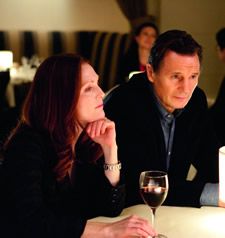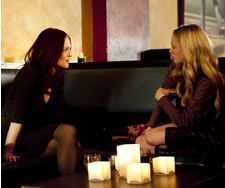
Julianne Moore and Liam Neeson in Chloe
Atom Egoyan's Chloe is a steamy, psychosexual remake of French Film Nathalie, concerning a long-time married woman (played in Egoyan's version by Julianne Moore) who becomes convinced that her husband (Liam Neeson) is having an affair. To test his fidelity she hires a hooker (Amanda Seyfried) to tempt him into straying... with disastrous consequences for her family. The film is something of a departure for Egoyan, since it is more mainstream than his previous work. We caught up with him when the film screened at San Sebastian Film Festival.
This film is more mainstream than your previous ones, did you find shooting it different – was it restrictive or liberating?
It wasn’t restrictive at all. It was much easier in a way because I didn’t have to worry about all the structural risks that the other films were taking. You read a screenplay and you know that the story works, it goes from point a to point b, so in that sense a lot of the pressure was off – and I enjoyed it. The question is: How many screenplays are this good? I’ve been getting screenplays since Exotica and they’re not usually this interesting. And this one was something I felt I could invest myself in.
Which do you prefer, making more individual, independent cinema or more commercial mainstream movies?
As a spectator, I feel comfortable in both films. But I realise my sensibility as a filmmaker is more individual and I resist formulas. I can watch formula but, as a maker, I’m very suspicious of being in a place that I think someone has been in before.
Is the world economic crisis affecting the world of movies? Did it affect this film in any way and will it affect any of your future projects?
We were very lucky with this film, I think really because of Studio Canal, but there’s no question there has been a huge crisis of funding for independent film. Many of the sources that were available have disappeared.
Were you worried about tackling a remake?
Nathalie is very different because the two women never fall for each other and don’t have this sort of relationship. Certainly the whole last part of the film is very different from the French original.

Could you tell us a bit about the casting of the film?
I was given the script two years ago and at that time we had open casting for Chloe. We saw every young actress in the world but when Amanda Seyfried walked in the room, she was it. It was before Mamma Mia and she wasn’t really a star at all but we said to her, ‘You’re Chloe’. Then I went to make Adoration and by the time I had finished it and come back she had become a major star. But she was into this so we were very lucky.
With Liam, I was fortunate enough to do a play with him in New York last summer and we got to know each other, so he said: ‘Let’s do something else.’ And I said: ‘Let’s do this.’ Even though it was just a supporting role, he was very committed and then we offered it to Julie, who is one of my favourite actresses. So the casting came together in a really great way.
You show a big difference in the way people feel about themselves. Liam Neeson's says, for example, that she’s beautiful but that’s not something she feels inside – is that something that you wanted to show?
I think people come to a point where they don’t allow themselves to feel beautiful. They are full of so many questions about their own beauty that they don’t allow themselves to feel they are worth the gaze of their loved ones. I think this is the crisis that Julie is facing – that she feels as if she’s disappearing. Is that her husband’s fault? Or is it her own fault for seeing herself that way, for putting herself in that panic? It’s a huge question. I think a lot of marriages go through this at a certain point. Is the problem resting with her or is it something about the way that he’s behaving – because he’s going through a panic as well. It’s a crisis. We fall in love with somebody in our twenties, then we change and we come very familiar – how do we reinvent that? So, she goes to this very extreme place.
I think what’s also as interesting is what Chloe is experiencing, which is also a panic. Where she’s thinking, at a young age, is this her life – is this what she will do for the rest of her life. She wants to feel protected and when she meets Catherine she meets this older woman that she feels can be protecting her. So these two women with very different crises collide and they find for this brief moment some sort of resolution. But it’s not sustainable.
How important was it to have the son in the film – a younger man who is having a crisis of his own?
He was originally more developed – we cut back a lot of the son. But there was a period where her life was just perfect, she had this incredible profession, great family, she had control of the son and then he goes off and goes through this change and she feels bereft by that and excluded both from her son and her husband.
You’ve used a lot of glass and mirrors.
There is a lot of glass – they live in a glass house. I’m interested in this idea we can protect ourselves, but it’s very fragile.
It’s almost as if we are looking in at rats and mice in a laboratory.
I hope it’s more emotionally accessible than that. That’s the way Catherine is seeing herself, she’s objectifying her own life, it’s part of the panic she is in.
What takes you into making films like this in which you are examining this difficult area of human relationships?
It’s always been a fascination. I think in all my films characters are in a difficult place. Characters have an image of who they are and something is shifting. Usually it’s younger characters who are coming of age and inspecting their life. So in films like Sweet Hereafter and Adoration, there are these young men or women who are coming to terms with their own reality and having to take control of that. And in this film, it’s an older woman, who’s also going through a revolution and trying to understand it. I love examining characters who are in a transitional moment.
Do you think marriage is still a valid formula for people?
It’s an examination of marriage. I think we demand a lot from marriages now – more than we used to. I think we used to see it as something that had to function at a practical level but now we want marriages to also be romantic and erotic and they have to last forever, so that’s a lot of pressure. And in our society that’s very challenging. So I think this is a marriage that can exist at some level because they like each other and have all the material comforts but it’s all about the crisis she’s going through. Also, the crisis he’s going through – Liam’s character. I think he’s constantly tempted probably to go outside of the marriage, but I think he’s being sincere when he says that he’s faithful but somehow Catherine doesn’t believe that she’s deserving of his faith. So it’s very difficult to sustain this situation.
Would you say you’re a pessimistic filmmaker?
No, I’m not pessimistic but I’m very aware that there are other motivations that inspire our behaviour. That we’re not always acting for the common good, that we’re often very absorbed by our own selfish desire to understand who we are. And sometimes it doesn’t work in a familial setting and certainly not in a collective setting. Catherine should just say: ‘I have the perfect life. I have a house, I have economic stability, why am I searching for more?’ But that’s human nature. You want to feel needed, you want to feel that you are worthy of someone’s love and that can be a very dark pursuit. So it’s not a question of pessimism it’s just a question of being realistic. Love can be very dark – it’s self-absorbed by its nature. If you can transcend self-love and think of it as being something outside of yourself, then of course you’re in a space of light, but it’s very challenging to get to that place.
Chloe is out in cinemas across the UK now.





















